
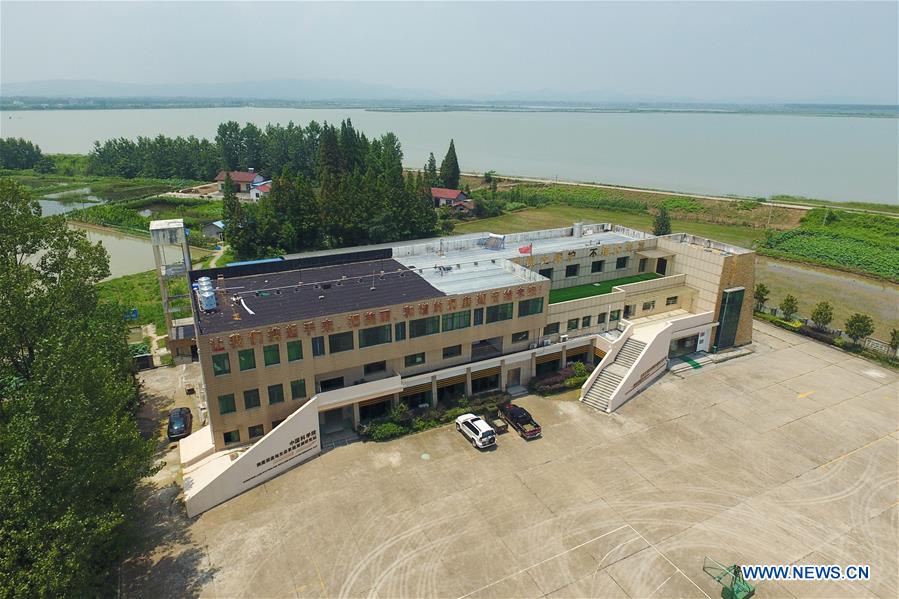
Aerial photo taken on July 10, 2018 shows the Dongting Lake station for wetland ecosystem research in Dongting Lake area, central China's Hunan Province. Collecting soil in spring, testing lake water in summer, investigating plants in autumn and observing migrant birds in winter outlined nearly ten years of seasonal cycle daily life of nameless scientific researchers in the Dongting Lake area. They have worked hard to supply solutions to protection of the environment and biological diversity here. The scientific researchers from the Chinese Academy of Sciences (CAS) were praised as the doctors of Dongting Lake wetland. In order to supply scientific support for ecological remediation of Dongting Lake, the CAS established an observation and research center in Dongting Lake wetland. As the second-largest freshwater lake in China, Dongting Lake played an important role in maintaining ecological balance of the Yangtze River valley and also was an important habitat for migrant birds, milu deer, finless porpoise and etc. The ecology system of Dongting Lake faced environmental deterioration once upon a time due to various reasons, and had been improved year by year due to measures taken by local government. According to an investigation in January 2018, over 226,000 migrant birds spent the winter in Dongting Lake, up 23 percent from a year earlier. (Xinhua/Xue Yuge)
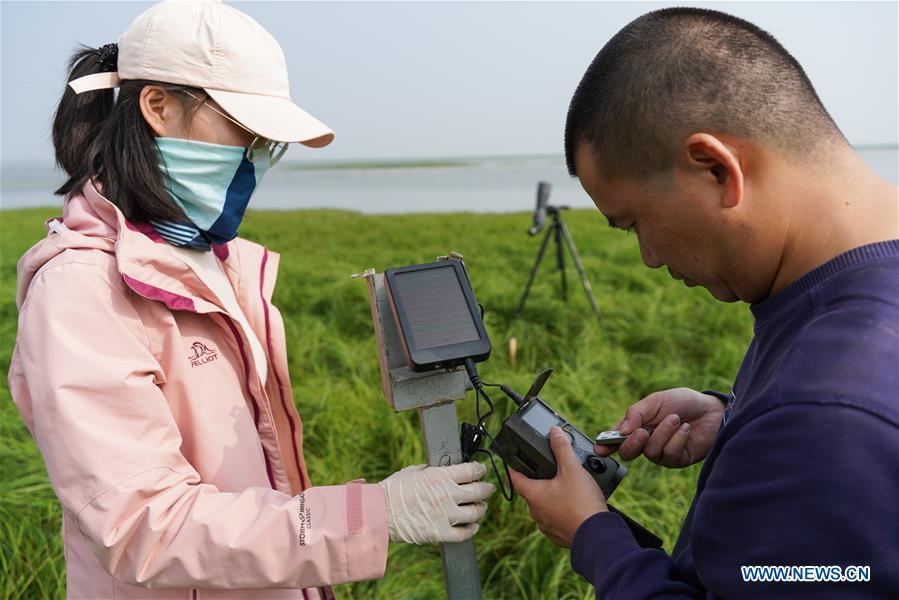
Zhang Siqi (L) and Zou Yeai, scientific staff members, set infrared monitoring camera in Dongting Lake area, central China's Hunan Province, Oct. 24, 2018. Collecting soil in spring, testing lake water in summer, investigating plants in autumn and observing migrant birds in winter outlined nearly ten years of seasonal cycle daily life of nameless scientific researchers in the Dongting Lake area. They have worked hard to supply solutions to protection of the environment and biological diversity here. The scientific researchers from the Chinese Academy of Sciences (CAS) were praised as the doctors of Dongting Lake wetland. In order to supply scientific support for ecological remediation of Dongting Lake, the CAS established an observation and research center in Dongting Lake wetland. As the second-largest freshwater lake in China, Dongting Lake played an important role in maintaining ecological balance of the Yangtze River valley and also was an important habitat for migrant birds, milu deer, finless porpoise and etc. The ecology system of Dongting Lake faced environmental deterioration once upon a time due to various reasons, and had been improved year by year due to measures taken by local government. According to an investigation in January 2018, over 226,000 migrant birds spent the winter in Dongting Lake, up 23 percent from a year earlier. (Xinhua/Chen Zeguo)
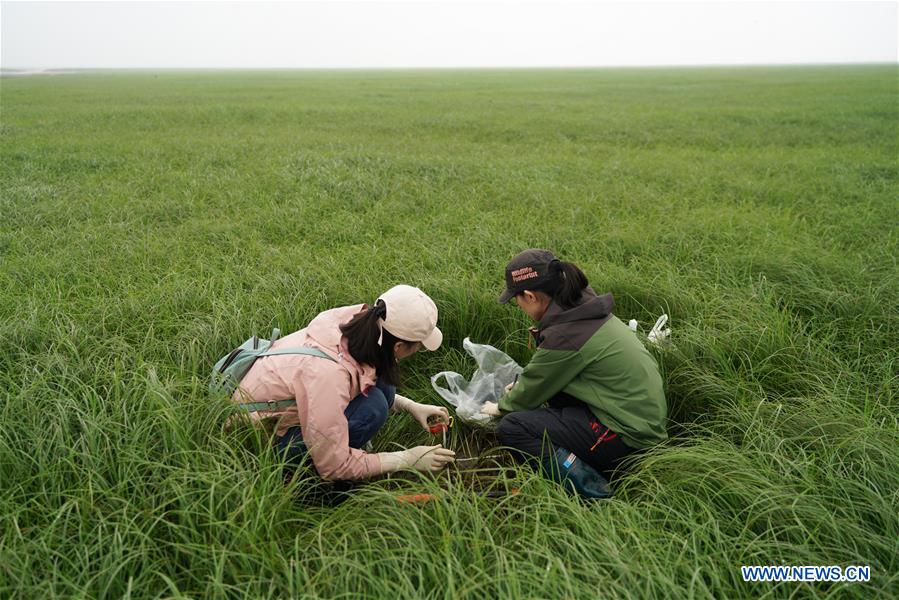
Zhang Siqi (L) and Zhang Pingyang, scientific staff members, collect plant sample in Dongting Lake area, central China's Hunan Province, Oct. 25, 2018. Collecting soil in spring, testing lake water in summer, investigating plants in autumn and observing migrant birds in winter outlined nearly ten years of seasonal cycle daily life of nameless scientific researchers in the Dongting Lake area. They have worked hard to supply solutions to protection of the environment and biological diversity here. The scientific researchers from the Chinese Academy of Sciences (CAS) were praised as the doctors of Dongting Lake wetland. In order to supply scientific support for ecological remediation of Dongting Lake, the CAS established an observation and research center in Dongting Lake wetland. As the second-largest freshwater lake in China, Dongting Lake played an important role in maintaining ecological balance of the Yangtze River valley and also was an important habitat for migrant birds, milu deer, finless porpoise and etc. The ecology system of Dongting Lake faced environmental deterioration once upon a time due to various reasons, and had been improved year by year due to measures taken by local government. According to an investigation in January 2018, over 226,000 migrant birds spent the winter in Dongting Lake, up 23 percent from a year earlier. (Xinhua/Chen Zeguo)
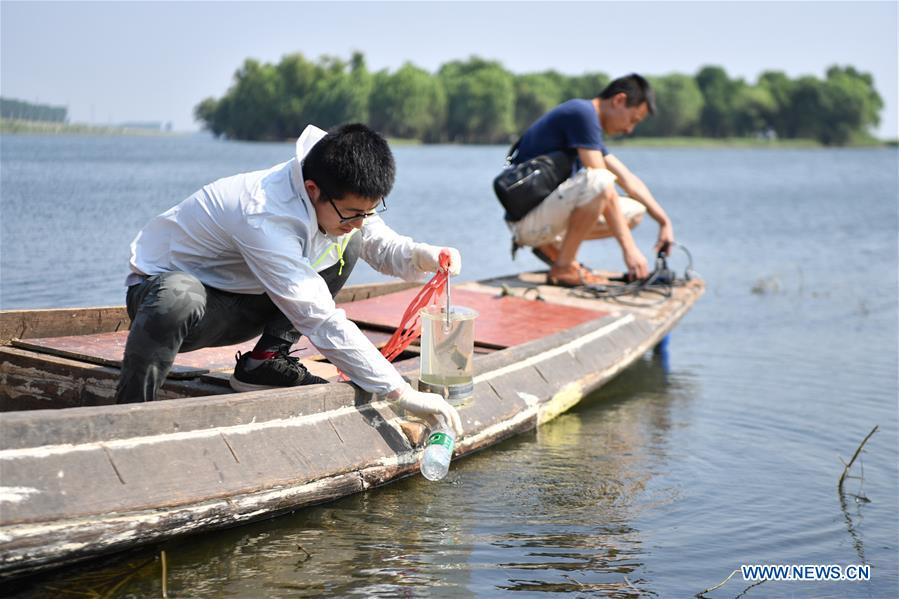
Geng Mingming (L), a scientific staff member, takes sample of lake water in Dongting Lake area, central China's Hunan Province, Aug. 25, 2018. Collecting soil in spring, testing lake water in summer, investigating plants in autumn and observing migrant birds in winter outlined nearly ten years of seasonal cycle daily life of nameless scientific researchers in the Dongting Lake area. They have worked hard to supply solutions to protection of the environment and biological diversity here. The scientific researchers from the Chinese Academy of Sciences (CAS) were praised as the doctors of Dongting Lake wetland. In order to supply scientific support for ecological remediation of Dongting Lake, the CAS established an observation and research center in Dongting Lake wetland. As the second-largest freshwater lake in China, Dongting Lake played an important role in maintaining ecological balance of the Yangtze River valley and also was an important habitat for migrant birds, milu deer, finless porpoise and etc. The ecology system of Dongting Lake faced environmental deterioration once upon a time due to various reasons, and had been improved year by year due to measures taken by local government. According to an investigation in January 2018, over 226,000 migrant birds spent the winter in Dongting Lake, up 23 percent from a year earlier. (Xinhua/Xue Yuge)
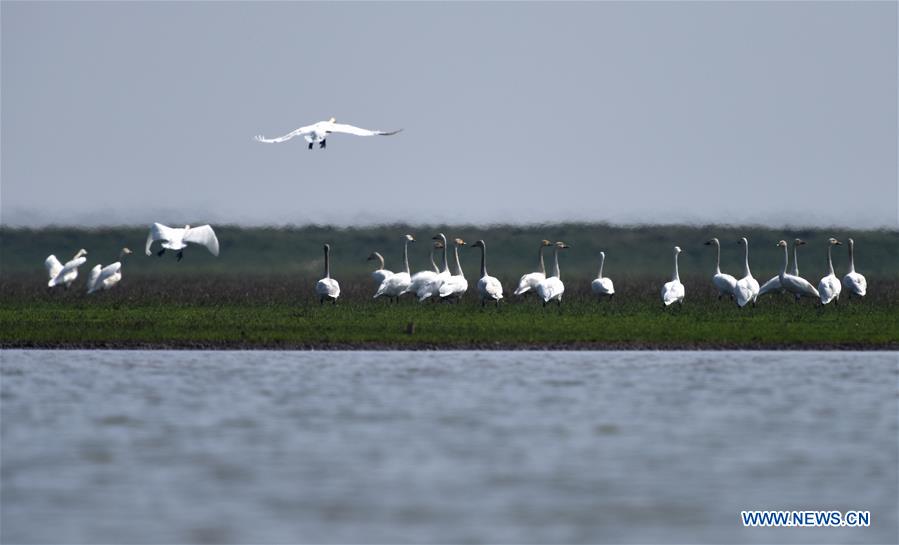
Swans are seen in an ecology remediation demonstration area in Dongting Lake area, central China's Hunan Province, Feb. 26, 2018. Collecting soil in spring, testing lake water in summer, investigating plants in autumn and observing migrant birds in winter outlined nearly ten years of seasonal cycle daily life of nameless scientific researchers in the Dongting Lake area. They have worked hard to supply solutions to protection of the environment and biological diversity here. The scientific researchers from the Chinese Academy of Sciences (CAS) were praised as the doctors of Dongting Lake wetland. In order to supply scientific support for ecological remediation of Dongting Lake, the CAS established an observation and research center in Dongting Lake wetland. As the second-largest freshwater lake in China, Dongting Lake played an important role in maintaining ecological balance of the Yangtze River valley and also was an important habitat for migrant birds, milu deer, finless porpoise and etc. The ecology system of Dongting Lake faced environmental deterioration once upon a time due to various reasons, and had been improved year by year due to measures taken by local government. According to an investigation in January 2018, over 226,000 migrant birds spent the winter in Dongting Lake, up 23 percent from a year earlier. (Xinhua/Li Ga)
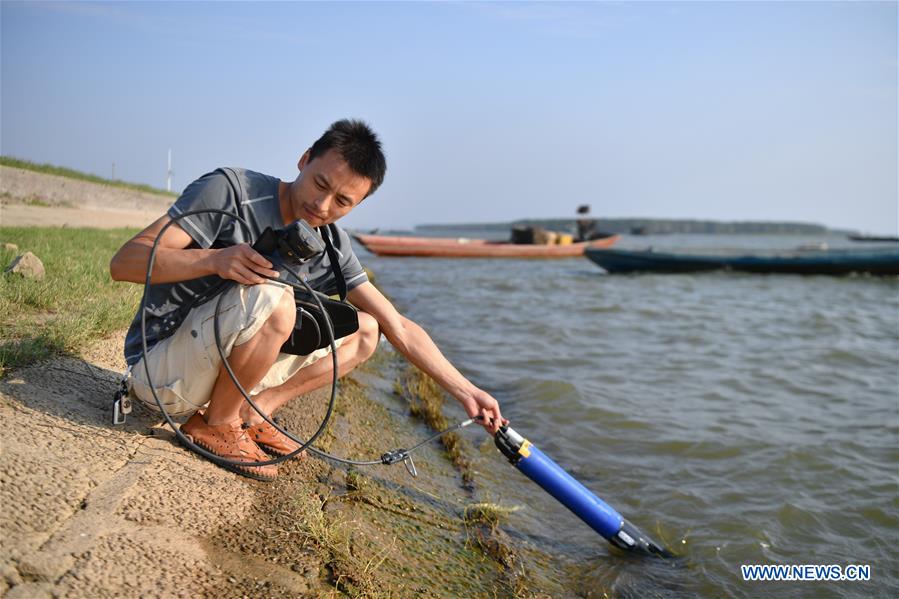
Li Xu, a scientific staff member, tests the water quality in Dongting Lake area, central China's Hunan Province, Aug. 24, 2018. Collecting soil in spring, testing lake water in summer, investigating plants in autumn and observing migrant birds in winter outlined nearly ten years of seasonal cycle daily life of nameless scientific researchers in the Dongting Lake area. They have worked hard to supply solutions to protection of the environment and biological diversity here. The scientific researchers from the Chinese Academy of Sciences (CAS) were praised as the doctors of Dongting Lake wetland. In order to supply scientific support for ecological remediation of Dongting Lake, the CAS established an observation and research center in Dongting Lake wetland. As the second-largest freshwater lake in China, Dongting Lake played an important role in maintaining ecological balance of the Yangtze River valley and also was an important habitat for migrant birds, milu deer, finless porpoise and etc. The ecology system of Dongting Lake faced environmental deterioration once upon a time due to various reasons, and had been improved year by year due to measures taken by local government. According to an investigation in January 2018, over 226,000 migrant birds spent the winter in Dongting Lake, up 23 percent from a year earlier. (Xinhua/Xue Yuge)
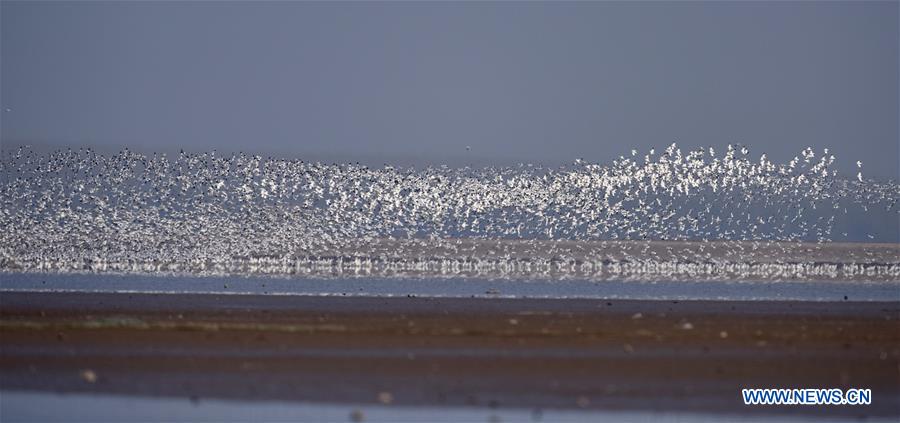
Birds fly in an ecology remediation demonstration area in Dongting Lake area, central China's Hunan Province, Feb. 26, 2018. Collecting soil in spring, testing lake water in summer, investigating plants in autumn and observing migrant birds in winter outlined nearly ten years of seasonal cycle daily life of nameless scientific researchers in the Dongting Lake area. They have worked hard to supply solutions to protection of the environment and biological diversity here. The scientific researchers from the Chinese Academy of Sciences (CAS) were praised as the doctors of Dongting Lake wetland. In order to supply scientific support for ecological remediation of Dongting Lake, the CAS established an observation and research center in Dongting Lake wetland. As the second-largest freshwater lake in China, Dongting Lake played an important role in maintaining ecological balance of the Yangtze River valley and also was an important habitat for migrant birds, milu deer, finless porpoise and etc. The ecology system of Dongting Lake faced environmental deterioration once upon a time due to various reasons, and had been improved year by year due to measures taken by local government. According to an investigation in January 2018, over 226,000 migrant birds spent the winter in Dongting Lake, up 23 percent from a year earlier. (Xinhua/Li Ga)
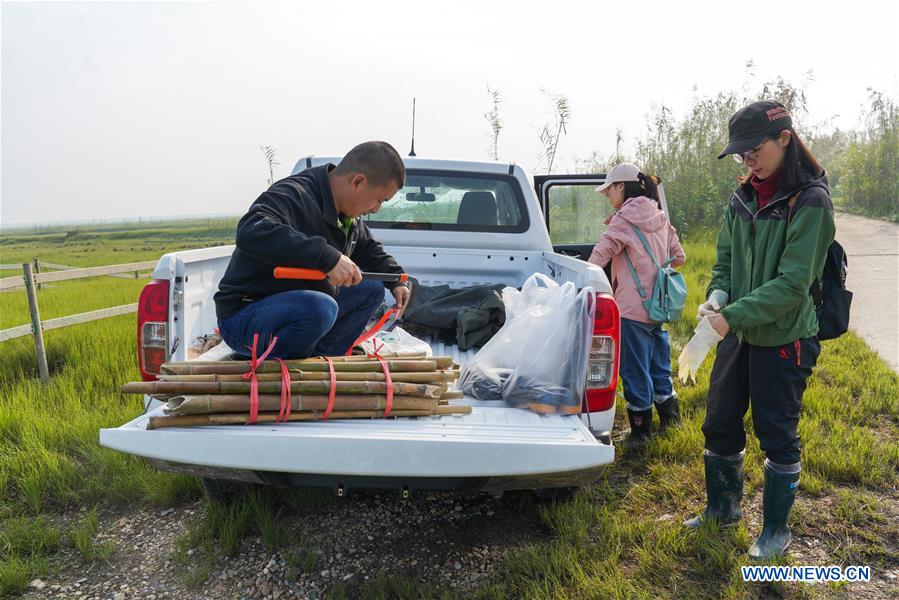
The scientific staff members get off the truck to start patrol in Dongting Lake area, central China's Hunan Province, Oct. 24, 2018. Collecting soil in spring, testing lake water in summer, investigating plants in autumn and observing migrant birds in winter outlined nearly ten years of seasonal cycle daily life of nameless scientific researchers in the Dongting Lake area. They have worked hard to supply solutions to protection of the environment and biological diversity here. The scientific researchers from the Chinese Academy of Sciences (CAS) were praised as the doctors of Dongting Lake wetland. In order to supply scientific support for ecological remediation of Dongting Lake, the CAS established an observation and research center in Dongting Lake wetland. As the second-largest freshwater lake in China, Dongting Lake played an important role in maintaining ecological balance of the Yangtze River valley and also was an important habitat for migrant birds, milu deer, finless porpoise and etc. The ecology system of Dongting Lake faced environmental deterioration once upon a time due to various reasons, and had been improved year by year due to measures taken by local government. According to an investigation in January 2018, over 226,000 migrant birds spent the winter in Dongting Lake, up 23 percent from a year earlier. (Xinhua/Chen Zeguo)

86-10-68597521 (day)
86-10-68597289 (night)

86-10-68511095 (day)
86-10-68512458 (night)

cas_en@cas.cn

52 Sanlihe Rd., Xicheng District,
Beijing, China (100864)

